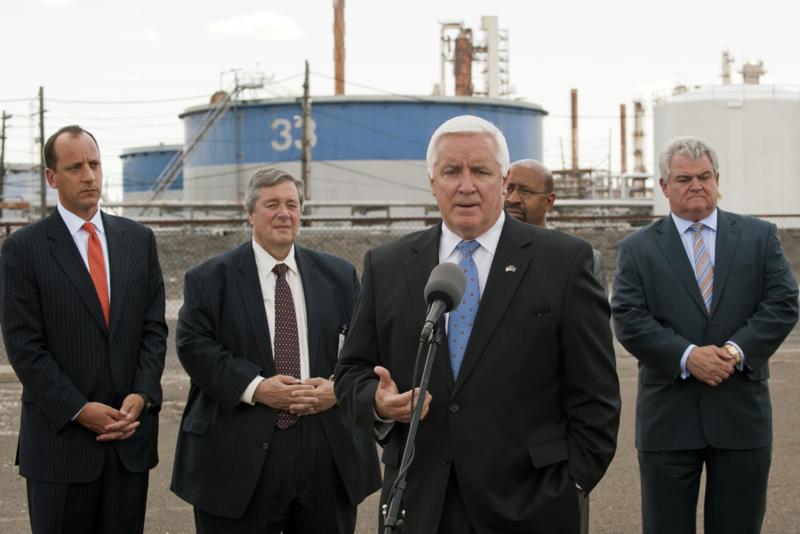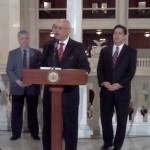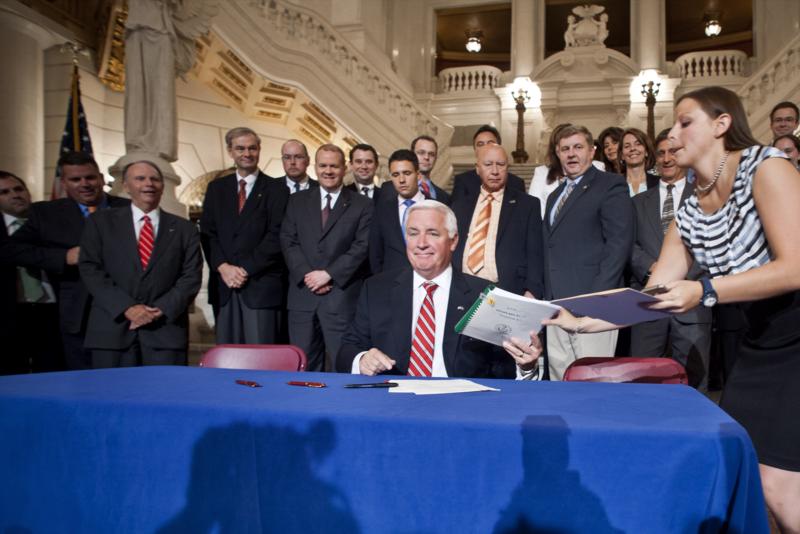Posts
Corbett Pleased with Recent Bipartisanship, Eager for More
/in News /by PAMattersWhile addressing upcoming talks of pension reform, on Radio PA’s Ask the Governor program, Tom Corbett emphasized that pensions are a bipartisan issue. “There has been an outbreak of bipartisanship as far as I am concerned, not only in Harrisburg but across Pennsylvania,” he continued.
Gov. Corbett cites bipartisan votes on a host of budget-related bills, including new education and energy tax credit programs. “We had labor and industry standing with me on the stage, prior to the budget, talking about the energy tax credit. Republicans and Democrats. I had to take a picture. I’m going to frame it and put it on the wall.”
Corbett adds that he’s been working closely with Democratic Congressman Bob Brady on regulatory issues that are proving to be vital to efforts to save jobs at several idled oil refineries in southeastern Pennsylvania.
“I bring this up because, right now, Washington can’t do it. Maybe the states need to lead the way as to how you get this done,” Corbett said of the bipartisan tone that he wants to carry over into the fall session.
Governor Tom Corbett on the positives from the Sandusky tragedy
/in Ask the Governor, Media, News, Video /by PAMattersGovernor Tom Corbett on the Freeh Report leaks
/in Ask the Governor, Media, News, Video /by PAMattersGovernor Tom Corbett on the Sandusky conviction and his involvement in the case
/in Ask the Governor, Media, News, Video /by PAMattersGov. Ready to Focus on Pension Reform This Fall
/in News /by PAMattersFresh off his second budget cycle, Governor Tom Corbett wants to address Pennsylvania’s rising pension costs this fall. While the Republican majority did not invite Democrats to the table for budget negotiations this spring, Corbett says public pensions are a different matter altogether. “This is not a partisan issue… so we’ll probably be reaching out to them,” he explained during a recent q&a with the media.
The governor says it was interesting to see many Democrats supporting some aspects of the budget package – including education reforms and an ethane cracker tax credit.
The state’s pension obligation will increase another $500 – $600-million next year alone, and there’s no relief in sight until 2024. Without action, there will be less and less funding available for other state programs. “It’s not just a problem that we have at the state. Municipalities & school districts across the state have that problem, and there are problems like that across the nation,” Corbett says.
Numerous bills have been introduced in the House. Senate Republicans plan to act on a plan to move all new hires to a 401K-style pension plan where the employee bears the risk, not the employer (in this case the taxpayer).
But, Corbett knows there’s no silver bullet. “If there was, somebody would have found it already, we’d all be doing it.” He anticipates a thoughtful, cooperative discussion this fall.
General Assistance Cash Grants to End Next Month
/1 Comment/in News /by PAMattersThis will be the last month of state-issued checks for more than 60,000 needy and disabled residents who’ve been beneficiaries of General Assistance cash grants from the Department of Public Welfare.
The roughly $150-million dollar program has been on the chopping block since Governor Tom Corbett’s initial budget plan was unveiled in February. Late in the budget process a deal was reached to allow for one additional month of checks to be issued, so as to ease the transition, but the program will soon be eliminated.
“Some of them will end up on the streets, some of them will end up in emergency rooms, some of them will end up in jail,” says Housing Alliance of Pennsylvania Executive Director Liz Hersh, who fears many of these vulnerable citizens will be left with nothing.
Senate Minority Appropriations Chair Vincent Hughes (D-Phila.) has a district office right around the corner from a welfare office. “Everyone’s in a panic,” he says of the knowledge that their lifeline is being cut.
But Governor Tom Corbett says his administration is working to connect people losing these state-funded cash benefits to other programs. “From discussions with staff, we believe that some people probably are not exercising access to some areas that they might have access to,” Corbett explained to reporters during recent budget negotiations.
Budget Package Signed Just Before Midnight Deadline
/in News /by PAMattersThe new fiscal year began on Sunday with the second straight on-time, no tax increase budget. “Today we reaffirm our commitment to job growth, to education, to the needy and to the taxpayers… our goal is growing new jobs,” Governor Corbett said upon signing the $27.7-billion dollar spending plan late Saturday night.
But critics say the new budget does little to preserve the social safety net. They lament the elimination of a cash grant welfare program for more than 60,000 needy and disabled residents. “A lot of men in my district will have no means of support. And in my district, no means of support means take what you need,” explains Rep. John Myers (D-Philadelphia). The administration has agreed to continue the program for one more month to ease the transition.
Governor Corbett says he’s pleased that an improving financial picture allowed them to restore funding to several areas, including the Accountability Block Grants that fund full-day kindergarten programs across the state. Public schools are essentially being level-funded this year, while an extra $40-million dollars has been earmarked for the most fiscally distressed districts.
One of the biggest budget restorations came in the area of higher education, where state-owned and state related universities had been facing cuts of 20% and 30% respective, which would have been on top of last year’s 18% and 20% cuts. The new level funding comes with a commitment from the university presidents that tuition hikes will be kept at a minimum for the upcoming school year.
Much of this weekend’s activity focused on the other executive and legislative priorities tied to this year’s budget. Lawmakers signed off on a new system of teacher evaluations for public school teachers, and an expanded Educational Improvement Tax Credit (EITC) program that will give businesses tax breaks when they fund school choice scholarships for low-income students in the state’s worst-performing schools.
Another big victory for the administration was the so-called “ethane cracker tax credit,” which Governor Tom Corbett has described as a new industrial revolution in Pennsylvania. It passed with broad, bipartisan support.
Charter school reform legislation did not get finalized before lawmakers’ summer break, however Corbett and leading Republicans vow to keep pressing the issue in the fall. Also, there will be a pilot program to offer county human services funding in block grants vs. seven separate line items. Up to 20-counties will be able to participate in the pilot; Corbett had originally proposed Human Services Block grants statewide.
Governor Tom Corbett on recent appointments and the current legislative session
/in Ask the Governor, Media, News, Video /by PAMattersWelcome to PAMatters.com, a new source for news and commentary from Pennsylvania’s capital. In addition to video, audio and pictures from the stories and events that affect YOU, you’ll also get some behind-the-scenes analysis via blogs from our award-winning staff of journalists.









